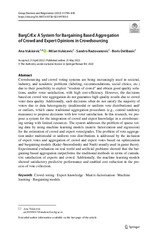Please use this identifier to cite or link to this item:
https://rfos.fon.bg.ac.rs/handle/123456789/2292Full metadata record
| DC Field | Value | Language |
|---|---|---|
| dc.creator | Vukicević, Ana | |
| dc.creator | Vukićević, Milan | |
| dc.creator | Radovanović, Sandro | |
| dc.creator | Delibašić, Boris | |
| dc.date.accessioned | 2023-05-12T11:40:09Z | - |
| dc.date.available | 2023-05-12T11:40:09Z | - |
| dc.date.issued | 2022 | |
| dc.identifier.issn | 0926-2644 | |
| dc.identifier.uri | https://rfos.fon.bg.ac.rs/handle/123456789/2292 | - |
| dc.description.abstract | Crowdsourcing and crowd voting systems are being increasingly used in societal, industry, and academic problems (labeling, recommendations, social choice, etc.) due to their possibility to exploit "wisdom of crowd" and obtain good quality solutions, and/or voter satisfaction, with high cost-efficiency. However, the decisions based on crowd vote aggregation do not guarantee high-quality results due to crowd voter data quality. Additionally, such decisions often do not satisfy the majority of voters due to data heterogeneity (multimodal or uniform vote distributions) and/or outliers, which cause traditional aggregation procedures (e.g., central tendency measures) to propose decisions with low voter satisfaction. In this research, we propose a system for the integration of crowd and expert knowledge in a crowdsourcing setting with limited resources. The system addresses the problem of sparse voting data by using machine learning models (matrix factorization and regression) for the estimation of crowd and expert votes/grades. The problem of vote aggregation under multimodal or uniform vote distributions is addressed by the inclusion of expert votes and aggregation of crowd and expert votes based on optimization and bargaining models (Kalai-Smorodinsky and Nash) usually used in game theory. Experimental evaluation on real world and artificial problems showed that the bargaining-based aggregation outperforms the traditional methods in terms of cumulative satisfaction of experts and crowd. Additionally, the machine learning models showed satisfactory predictive performance and enabled cost reduction in the process of vote collection. | en |
| dc.publisher | Springer, Dordrecht | |
| dc.relation | Office for Naval Research, the United States [ONR - N62909-19-1-2008] | |
| dc.rights | openAccess | |
| dc.source | Group Decision and Negotiation | |
| dc.subject | Matrix-factorisation | en |
| dc.subject | Machine learning | en |
| dc.subject | Expert knowledge | en |
| dc.subject | Crowd-voting | en |
| dc.subject | Bargaining models | en |
| dc.title | BargCrEx: A System for Bargaining Based Aggregation of Crowd and Expert Opinions in Crowdsourcing | en |
| dc.type | article | |
| dc.rights.license | ARR | |
| dc.citation.epage | 818 | |
| dc.citation.issue | 4 | |
| dc.citation.other | 31(4): 789-818 | |
| dc.citation.rank | M21~ | |
| dc.citation.spage | 789 | |
| dc.citation.volume | 31 | |
| dc.identifier.doi | 10.1007/s10726-022-09783-0 | |
| dc.identifier.fulltext | http://prototype2.rcub.bg.ac.rs/bitstream/id/826/2288.pdf | |
| dc.identifier.pmid | 35615756 | |
| dc.identifier.rcub | conv_2685 | |
| dc.identifier.scopus | 2-s2.0-85130217651 | |
| dc.identifier.wos | 000801210900001 | |
| dc.type.version | publishedVersion | |
| item.cerifentitytype | Publications | - |
| item.fulltext | With Fulltext | - |
| item.grantfulltext | open | - |
| item.openairecristype | http://purl.org/coar/resource_type/c_18cf | - |
| item.openairetype | article | - |
| Appears in Collections: | Radovi istraživača / Researchers’ publications | |
SCOPUSTM
Citations
5
checked on Nov 17, 2025
Page view(s)
16
checked on Dec 28, 2025
Download(s)
4
checked on Dec 28, 2025
Google ScholarTM
Check
Altmetric
Items in DSpace are protected by copyright, with all rights reserved, unless otherwise indicated.

